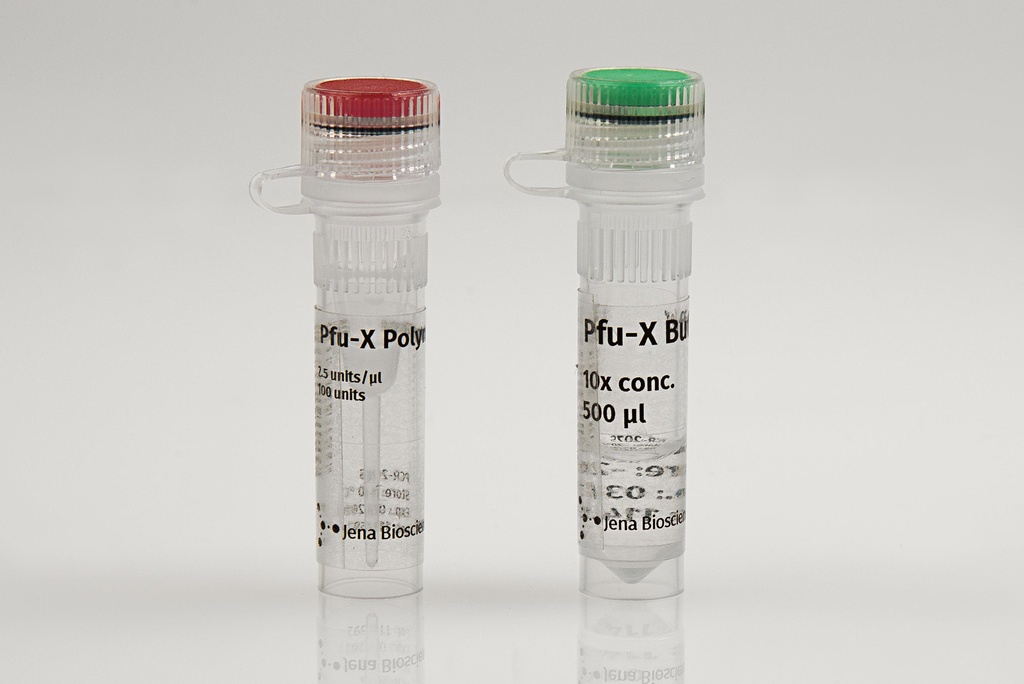Pfu-X Polymerase
Detailní popis
Pyrococcus furiosus, recombinant, E. coli
For general laboratory use.
Unit Definition: One unit is defined as the amount of the enzyme required to catalyze the incorporation of 10 nmol of dNTP into an acid-insoluble form in 30 minutes at 74 °C.
Shipping: shipped on gel packs
Storage Conditions: store at -20 °C
avoid freeze/thaw cycles
Shelf Life: 12 months
Form: liquid
Concentration: 2.5 units/μl
Description:
Pfu-X Polymerase is the ideal choice for applications where the efficient amplification of DNA with highest fidelity is required. The enzyme is a genetically engineered Pfu DNA polymerase, but showing a 2-fold higher accuracy and an increased processivity, resulting in shorter elongation times.
The enzyme catalyzes the polymerization of nucleotides into duplex DNA in 5'→3' direction but does not possess a 5'→3' exonuclease replacement activity. Its inherent 3'→5' exonuclease proofreading activity results in a greatly increased fidelity of DNA synthesis compared to Taq polymerase. Pfu-X Polymerase-generated PCR fragments are blunt-ended. The enzyme is highly purified and free of bacterial DNA.
Fidelity of the enzyme:
Pfu-X Polymerase is characterized by a 50-fold higher fidelity compared to Taq polymerase and a 2-fold higher fidelity compared to standard Pfu polymerase.
ERPfu-X Polymerase = 0.25 x 10-6
The error rate (ER) of a PCR reaction is calculated using the equation ER = MF/(bp x d), where MF is the mutation frequency, bp is the number of base pairs of the fragment and d is the number of doublings
(2d = amount of product / amount of template).
Content:
Pfu-X Pol (red cap)
2.5 units/μl Pfu-X Polymerase in storage buffer
(50 % Glycerol, 50 mM Tris-HCl pH 8.0, 0.1 mM EDTA, 1 mM DTT 0.1 % Tween 20, 0.1 % Nonidet P-40)
Pfu-X Buffer (green cap)
10x conc.
Recommended 50 μl PCR assay:
| 5 μl | 10x Pfu-X Buffer | green cap |
| 200 μM | each dNTP | - |
| 0.4 μM | each Primer | - |
| 1 - 100 ng | template DNA | - |
| 0.5 μl (1.25 units) |
Pfu-X Pol | red cap |
| Fill up to 50 μl | PCR-grade water | - |
Please note that it is essential to add the polymerase as last component.
Recommended cycling conditions:
Three-step standard protocol
| initial denaturation |
95 °C | 2 min | 1x |
| denaturation | 95 °C | 20 sec | 25-30x |
| annealing1) | 50 - 68 °C | 30 sec | 25-30x |
| elongation2) | 68 °C | 1 min/kb | 25-30x |
| final elongation |
68 °C | 1 min/kb | 1x |
Two-step protocol for amplification of longer fragments (>3 kb)
Please note that for performing two-step cycling a sufficiently high primer Tm is necessary. If Tm of primers is below 65 °C or two-step PCR does not yield a sufficient product quality the three-step cycling protocol is recommended.
| initial denaturation |
95 °C | 2 min | 1x |
| denaturation | 95 °C | 20 sec | 25-30x |
| annealing/ elongation1,2) |
68 °C | 30 sec/kb | 25-30x |
| final elongation |
68 °C | 30 sec/kb | 1x |
1) The annealing temperature depends on the melting temperature of the primers used.
2) The elongation time depends on the length of the fragments to be amplified. A time of 1 min/kb is recommended.
For optimal specificity and amplification an individual optimization of the recommended parameters may be necessary for each new template DNA and/or primer pair.
Related products:
- Ready-to-Use Mixes / direct gel loading
- Ready-to-Use Mixes
- Thermophilic Polymerases
- Deoxynucleotides (dNTPs)
- Supplements
- Primers and Oligonucleotides
- DNA Ladders
BIOZ Product Citations:
Please click the arrow on the right to expand the citation list. Click publication title for the full text.
Hodnocení produktu
Produkt zatím nikdo nehodnotil, buďte první!

